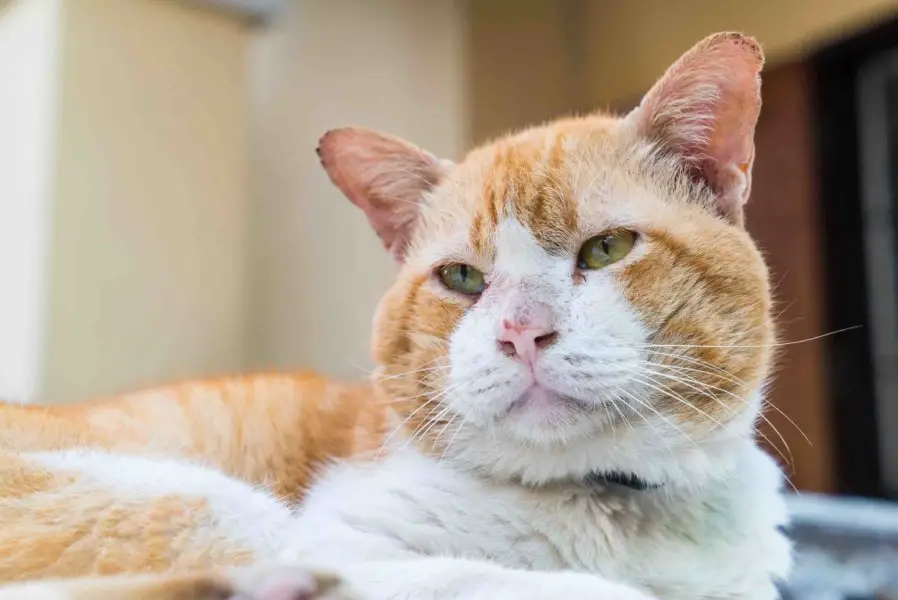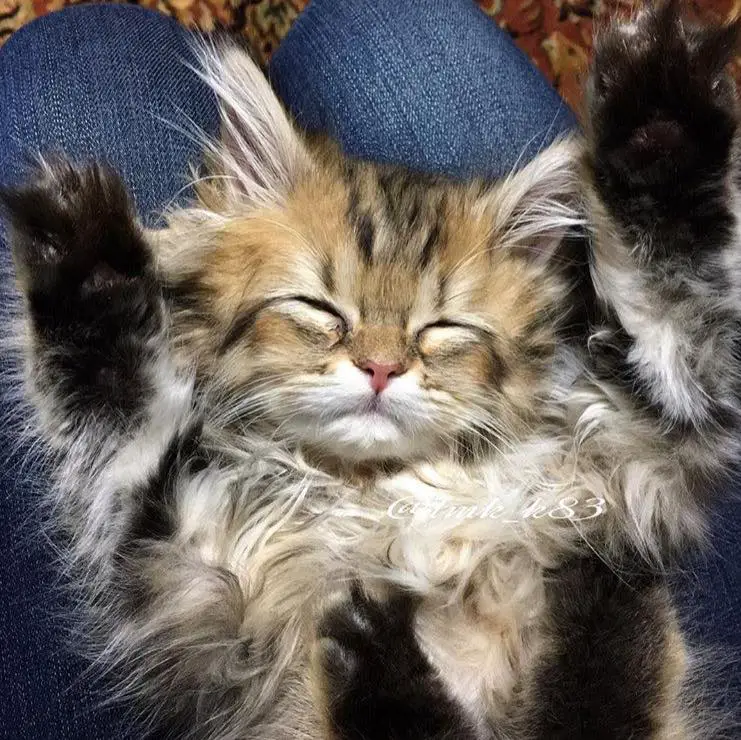By Guest Blogger Chelsy Ranard
In this guest blog post, Chelsy shares her experience adopting a senior cat. If you’ve ever adopted a senior cat, tell us if you had a similar or different experience!
On Friday mornings I volunteer at a local cat shelter cleaning rooms and cuddling kitties for a few hours. There have been many cats that I created a connection with that were difficult to leave every week, but I felt good leaving them knowing they were in a cageless, no-kill shelter where I knew they’d be adopted in due time. However, one Friday I met a lovely five pound, 12-year-old senior cat named Fawn. Week after week she was still there despite her friendly disposition, her earthquake purr, and her endearing sneer due to an extracted tooth. After too many weeks seeing her remain in the shelter as more and more potential adoptees passed her by, I finally took her home.
I realized just how hard it is for a senior cat to find a forever home despite all of their desirable characteristics. She’s only the second cat I’ve ever adopted and once I got her home I realized just how amazing it is to adopt a senior cat. She’s incredibly adaptable, easy to please, I wasn’t in for any surprises, and I knew I was making a big difference in her life as well as mine.
Senior cats tend to be more adaptable
Older cats might be a bit grumpier than the average cat, but overall they are much more tolerant than most cats. Cats can be particular and temperamental, but older cats have a more blasé attitude. Many cats have issues adapting to new surroundings or new family members, but a senior cat will roll with the punches. If you move, for instance, you should still practice safe moving procedures with your pets, but your senior cat will be much more tolerant of this life change than a younger cat due to their easygoing attitude. They still may not enjoy the change – many cats don’t – but they tend to be more accepting of it.
Grooming, petting, cuddling, and handling younger animals all seem to come easier to an older cat. Even if they are bothered, they tend to remove themselves from a situation quietly instead of having a kitty meltdown like some younger cats. When I brought Fawn home, for instance, I brought her into a house with a German Shepherd puppy and a bratty adult cat. She handled the dog’s over-the-top friendliness with patience and shrugged off the adult cat’s annoyance and went to find a quiet spot to sleep.

Senior cats don’t require a ton of stimulation
My senior kitty is the most low-maintenance creature I’ve ever cared for. More so than my plants, even. She’s content to have an area to herself with food and water. She’s not very interested in toys and she will let us know when she wants attention. Of course, it’s difficult to generalize any group of animals, but in my experience adopting a senior cat and spending time with them at the shelter, this seems to be true for many. Senior cats might need more health maintenance, but overall they are easy to please. Kittens need a ton of attention and tend to be up in your business. They are adorable little disasters in some cases where they turn everything into a toy, your toes are the enemy, and your house and flesh fall victim to their teeth and claws until they learn their manners. Senior cats, however, are quiet friends interested in a nap or a cuddle and have called a truce with all toes and fingers. Every cat is different, but in general they don’t need as much focus or energy as younger animals.
To please your senior cat, consider turning the area under your stairs into a senior kitty sanctuary – or find another comfy area in your home that your senior cat can call home. Give them a nice comfy bed, make sure they don’t have to climb or jump too much to get to it, give them fresh water and food, and they will be as happy as can be.
Senior cats’ personalities are fully established, so you know the cat you’re getting
Adopting a senior cat means you know exactly what you’re getting. If you adopt a senior cat that’s clean, friendly, and solitary you’ll bring home a cat that’s clean, friendly, and solitary. When you adopt a kitten you don’t really know the cat they will turn into as they get older. Their personality has already been developed and you’ll have a good idea if they are a good fit for the family. If you’re looking for a lap cat, you’ll know if your senior cat enjoys lap nap time before you adopt them. You’ll be aware of any health conditions before you adopt, you’ll have a cat that’s been fixed and vaccinated, and you’ll have a cat that has reached its peak size. There are so many more variables when you’re adopting a younger cat than when you’re adopting an older cat. Many shelters with experience in feline personalities have supported the claim that an older cat is a great fit for adoption because you know exactly what kind of cat you’re adopting and use this as one of the many reasons potential adopters should choose an older feline friend.
You are saving a life
Senior cats have the hardest time finding a home and in many cases you’ll be saving that cat’s life. When senior cats live as strays they have a lower chance of surviving the conditions. In a shelter environment an elderly cat may be euthanized for space. Many people don’t want to adopt a senior cat for fear that they won’t have much time with them or that they may be more expensive due to their health, but in reality many senior cats are still healthy and a reputable shelter will ensure they are healthy before adoption. Also, cats are considered to be a senior anywhere from 7-14 year old depending on their health, and considered geriatric from age 15 and older and many cats can live into their twenties. And even if you don’t get much time with them, you’re giving them a loving home for their remaining time here.
My little Fawn spends most of her days sleeping on a pillow in our spare room. She meows on the rare occasion that she wants attention, endures the dog’s kisses, and purrs like a chainsaw while napping with my husband. She’s a very quiet addition to our family, but a welcomed and loved addition. I’m glad that her final time here will be spent on a comfortable pillow with a forever family. It means the world to her and all I had to do was provide food, water and love.
About the Author
Chelsy Ranard is a writer from Montana who is now living in Boise, Idaho. She graduated with her journalism degree from the University of Montana in 2012. She enjoys napping with her cats, throwing a Frisbee with her pup, and volunteering at Simply Cats in Boise.
